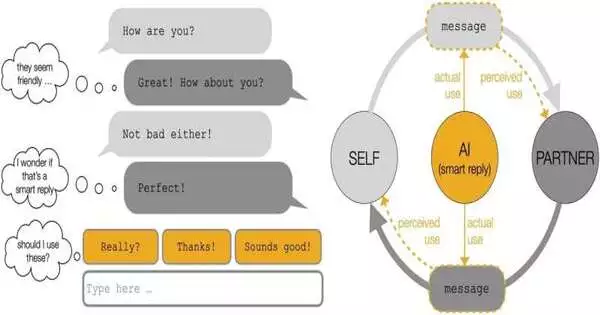According to a team of Cornell researchers, when using a chat tool with artificial intelligence, people communicate more effectively, express themselves more positively, and view each other more favorably.
The leading author of the Scientific Reports article “Artificial Intelligence in Communication Impacts Language and Social Relationships” is postdoctoral researcher Jess Hohenstein.
The co-authors are Rene Kizilcec, an assistant professor of information science at the Cornell Ann S. Bowers College of Computing and Information Science (Cornell Bowers CIS), and Malte Jung, an associate professor of information science.
“Technology firms frequently stress the value of AI technologies in completing jobs quicker and better, while ignoring the social dimension. We do not live or work in isolation, and the systems we use have an influence on how we connect with others.”
Malte Jung, associate professor of information science in the Cornell Ann S.
The future of society, communication, and work will be impacted by generative AI. Large language models (LLMs) like ChatGPT and GPT-4 continue to demonstrate their technical prowess on a daily basis, but the social ramifications of their use in our everyday lives are still poorly understood.
Although AI tools have the potential to increase productivity, they might also have unfavorable social consequences. Hohenstein and colleagues looked at how people express themselves and interact with one another when artificial intelligence (AI) is used in conversation.
Technology firms frequently highlight how useful AI tools are for completing tasks more quickly and effectively, but Jung claimed that they neglect the social component. “We do not work and live alone, and the systems we employ have an impact on how we interact with others.”.
The research team discovered that participants perceive their partner as less cooperative and feel less affection toward them when they believe their partner is using more AI-suggested responses than they are. This is in addition to greater efficiency and positivity.
Hohenstein said, “I was surprised to find that people tend to judge you more negatively just because they think you’re using AI to assist with text composition, whether or not you actually are.” This demonstrates the lingering mistrust that people seem to have for AI in general.
A smart-reply platform called “Moshi” (Japanese for “hello”) was created by the group as their initial experiment by co-author Dominic DiFranzo, a former postdoctoral researcher in the Cornell Robots and Groups Lab who is currently an assistant professor at Lehigh University. Moshi was modeled after the now-defunct Google “Allo,” the first smart-reply platform, which was unveiled in 2016. LLMs are used to generate intelligent responses that foresee likely outcomes following chat-based interactions.
A total of 219 participants were paired up and asked to discuss a policy issue under one of three conditions: both participants can use smart replies, only one participant can use smart replies, or neither participant can use smart replies.
The researchers discovered that using clever responses improved communication effectiveness, positive emotional language, and favorable assessments by conversation partners. 1 in 7 messages sent on average had a smart reply, or 14% of messages.
However, participants who were suspected by their partners of typing their own responses were rated more negatively than those who were believed to have used smart replies, which is consistent with widely held beliefs about the unfavorable effects of AI.
In a second experiment, 299 randomly selected pairs of participants were asked to discuss a policy issue under one of four conditions: no smart replies, the default Google smart replies, smart replies with a positive emotional tone, and smart replies with a negative emotional tone. Conversations with positive and Google smart replies had a more upbeat emotional tone than conversations with negative or no smart replies, demonstrating the influence that AI can have on language production in everyday conversations.
While AI may be able to assist with writing, Hohenstein noted that it will likely change the way you speak, particularly by making you sound more upbeat. This implies that you may be giving up some of your unique voice if you use text-generating AI.
The effect that AI has on social dynamics and some potential unintended consequences of integrating AI in social contexts are what we observe in this study, according to Jung. This implies that whoever is in charge of the algorithm may have an impact on how people interact, speak, and perceive one another.
More information: Jess Hohenstein et al, Artificial intelligence in communication impacts language and social relationships, Scientific Reports (2023). DOI: 10.1038/s41598-023-30938-9





